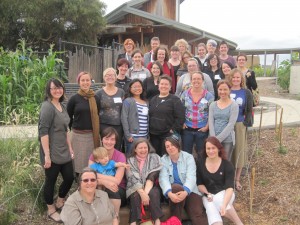I had a wonderful time at the first AdaCamp, held in Melbourne, Australia on January 14, 2012.
I didn’t take notes during most of the sessions, and spent a lot of time listening and thinking.
The two important things I took away from the first AdaCamp were about context – my context, and the camp itself.
My context
I’ve been part of free and open source community since 1994, when I started reading the linux kernel mailing list and compiling my own kernels to support experimental features and drivers. I was welcomed into my mostly male offline community of developers, sysadmins and hackers. I had a male psuedonym when I was online in technical forums. I used a female psuedonym on mailing lists and collaborative writing projects I was invited to back in the early days of alt.* threads that spilled over into specialty LISTSERV mailing lists.
I’d grown up in a very small town, where your reputation is everything. It was incredible, strange and liberating to be able to represent all the parts of me, separately and freely, online.
So, when I got to AdaCamp I felt apprehensive. I’ve had the option of separating out the parts of me online and in free and open source community for so long, and I was struggling with what part of me exactly should be at the forefront here. Being a woman is a pretty important aspect of myself. Addressing it in parts felt wrong, but integrating it all seemed like an oversimplification.
So, I tried to make myself useful by making coffee and sorting out our wireless situation. Then we all got together in a room. I made a few jokes with the people at my table and then fell silent.
Mary and Val opened the day with a short introduction and an explanation of why they thought it was important to have conversations about open tech and culture in a feminist context. And then we started going through the introductions.
I was so terrified to introduce myself that I ran out to work on the wireless network and missed out on most of the introductions. At least we had wireless working after that. 🙂
It seems so silly to me now that I chose to walk out of the intros. Val didn’t let me off the hook when I got back, and I had to briefly introduce myself to everyone. And the reason why I’m spilling so many words on this point is that I want to let you all know how difficult it is to change your context.
I have identified as a feminist for as long as I can remember. But I’ve nearly always been a feminist in the company of men. If I were to introduce myself again, I would say:
I am a feminist hacker. Right now, my hacking is mostly on people and systems. I believe women and men should be treated equally, but I know they are not. And I want to help solve problems of inequality faced by women, primarily through my work in free and open source software, but also in the workplaces where many of our fellow hackers end up.
Context of the camp
There were too many fantastic conversations to count. I met so many new friends, and came away with new respect for the work Mary and Val are tackling.
Two big sessions for me were a frank conversation about hiring, and an expansive brainstorm about the things women have in common between free and open source, open culture, open hardware, creative commons, remix culture and other “open stuff”. I’m looking forward to future conversations about both things!
During the closing session, many thoughts were shared about what made a day spent talking about so many difficult problems still feel inspiring.
One comment stuck with me – we all shared a context of feminism. With that point settled, it made getting into the depths of many other conversations much easier and interesting. We got to skip over many feminism 101 topics, and have spirited debates and exchanges of ideas in a feminist context.
I hope I can attend the next event!
And you can support the Ada Initiative by donating here.

We need other acknowledged feminists to talk to. Many of us have spent too much time alone and “crazy”. I am counting on angels like this Ada Camp to keep up the good work. But take care–burnout and hard jabs from women and men can hurt a lot. After 30+ years in the industry I know this to be true. But there are people who treat people as people and they also can be drawn in for support.
🙂 Thanks, Elein. We had one talk about burnout and an issue that was raised but not discussed in-depth was how women can better support each other. That is something I’d like to explore further.
It was lovely to meet you there!
Very nice to meet you as well! 🙂
Thanks for writing about adacamp selena. I’m hungry to hear all about it because I couldn’t be there.
Thanks also for expressing your discomfort and retreat at the beginning of the event – and for overcoming it.